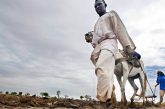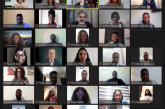Investigate Alleged Security Force Abuses in Mopti Region
NEW YORK, USA, April 20, 2021,-/African Media Agency (AMA)/-Malian soldiers have allegedly killed at least 34 villagers, forcibly disappeared at least 16 people, and severely mistreated detainees during counterterrorism operations in Mali’s central Mopti region, Human Rights Watch said today.
Mali’s transitional government should conduct credible and impartial investigations into these incidents. All were committed since the transitional government took power in an August 18, 2020 coup.
“Mali’s security forces have shown scant regard for human life during recent counterterrorism operations,” said Corinne Dufka, Sahel director at Human Rights Watch. “Committing serious abuses in the name of security only fuels recruitment into abusive armed groups and undermines trust by local populations.”
The government said it had opened investigations into incidents in the towns of Libé and Kobou, but family members of victims told Human Rights Watch that the authorities had not contacted them. Mali’s military prosecutors should independently investigate the allegations and suspend officers implicated in serious abuses. The Defense Ministry should ensure that gendarme military police, mandated to promote discipline and safeguard the rights of detainees, are present in all military operations.
Human Rights Watch interviewed in person and by telephone 43 people with knowledge of seven incidents in which the security forces allegedly committed serious abuses. The interviews, between November 2020 and April 2021, included witnesses, local community leaders, government officials, and foreign diplomats. The incidents took place between October 2020 and March 2021 in and around the towns, villages, or hamlets of Boni, Feto Hore Niwa, Kobou, Libé, Solla, and Sokoura.
The Malian security forces allegedly committed the abuses during military operations in response to the presence of Islamist armed groups largely linked to Al-Qaeda. The findings build on Human Rights Watch research in central Mali since 2015. Human Rights Watch is also documenting serious abuses by Islamist armed groups and ethnic militias in central Mali during the same period, including the summary executions of civilians and the indiscriminate use of improvised explosive devices. These findings will be published in an upcoming report.
Witnesses described how on March 23 soldiers in Boni detained, blindfolded, and severely beat dozens of bus passengers after finding suspicious material in the baggage compartment. At least 13 of the passengers have been “disappeared.”
Ten witnesses described an October 22, 2020 army operation in and around Libé village during which the security forces allegedly killed 25 villagers including women, children, and older people, many as they tried to flee.
One villager described seeing soldiers execute six men they had detained minutes before. “The soldiers marched the men into an abandoned shop,” he said. “One [soldier] who’d taken up position at the door opened fire. They lay there, dying as the floor flooded with blood.”
All parties to Mali’s armed conflict are bound by Common Article 3 of the Geneva Conventions of 1949 and other treaty and customary laws of war, which provide for the humane treatment of captured combatants and civilians in custody. Individuals who commit serious violations of the laws of war, including summary executions and torture, may be prosecuted for war crimes. Mali is a party to the Rome Statute of the International Criminal Court, which has opened an investigation into alleged war crimes committed in Mali since 2012.
Human Rights Watch on April 7 sent a letter to the Malian government detailing the alleged abuses in this report. In its April 13 response, the general secretary of the Ministry of Defense and Veterans Affairs said that for all of the incidents cited in the report, “investigations have been opened and are ongoing,” and noted that some members of the army have been questioned. The letter added that investigations into the Libé and Kobou allegations have been hampered by the precarious security situation and the reluctance of some witnesses to provide testimony.Response letter from the Ministry of Defense and Veterans AffairsResponse letter from the Ministry of Defense and Veterans Affairs
“Promising to investigate abuses is a positive step, but the Malian government has failed to make good on many previous such commitments,” Dufka said. “The Malian authorities should rein in abusive units and do much more to ensure discipline in operations, hold abusers to account, and prevent further atrocities.”
For details on the recent alleged abuses by Malian security forces, please see below.
Alleged Abuses by the Malian Army in Mopti Region
Boni, March 2021
On March 18, security forces in Boni, Douentza cercle [administrative area] allegedly executed Boucary Boulde, 37, and Salmane Hamne Noungary, 35, minutes after a soldier was killed and another gravely injured by an improvised explosive device. Three witnesses said a soldier targeted the victims at random out of a group of traders passing by on their way to the Boni market.
One witness said:
We found ourselves behind a convoy of soldiers when the explosion went off around 9:10 a.m. The soldiers ordered everyone on the road to lie down. Boucary and Salmane happened to be just 10 meters behind the FAMa [Forces Armées Maliennes, or Malian army] vehicles. After firing in the air, a soldier dragged them from their motorcycles and executed them point-blank, no questions asked. Boukary was still alive but no one dared help him; he died a few minutes later. Both were shot at least two times.
Later, soldiers severely beat and robbed over a dozen family members waiting for permission to take the bodies for burial. “As we waited by the bodies, the FAMa started beating and kicking us,” a family member said. “After throwing us in their vehicles, they stole our phones, eight motorcycles, and money.”
On March 23, security force members performing a routine control at a checkpoint near Boni found a military uniform and boots in the baggage compartment of a bus that had left Bamako, the capital, on March 22. Perhaps because they felt the uniform was being used by an armed Islamist, the soldiers bound and blindfolded about 35 male passengers and took them to the military camp, where they severely beat them over many hours.
The circumstances or whereabouts of at least 13 of these men remains unknown. Numerous witnesses to the arrests and mistreatment expressed concern that the men were beaten to death in custody. Human Rights Watch received credible information that the security forces buried a number of bodies in a common grave on March 25, approximately one kilometer from their camp.
Human Rights Watch spoke with 15 people with knowledge of the incident, including passengers, family members of the disappeared, and villagers, and reviewed a video showing 13 men after their 24-hour detention, who had visible signs of having been severely mistreated. Twelve of the disappeared men, whose names family members provided to Human Rights Watch, were from Burkina Faso. The family members said the men had been living as refugees in Bamako for several years and were on their way back to their villages given the improving security situation in Burkina Faso.
“We arrived at the checkpoint around 5 p.m.,” one passenger said. “The soldiers ordered us down and checked our IDs. Our drama started when they found the Rangers [boots] and uniform. They flew into a rage, tearing clothing from the luggage with which they blindfolded us and bound our hands.”
A bystander said: “They divided 35 men into three groups, according to their ages, put them in military vehicles, and drove in the direction of their camp, 500 meters away. They didn’t harm or detain the eight female passengers.”
Describing the mistreatment, one passenger said, “The beating started in front of the bus. They kicked and beat us in a savage way with belts, tree branches, and rifle butts.” The abuse continued in the military camp.
“They beat and pummeled us all night,” another passenger said. “I was in severe pain. I was burned with a cigarette. Throughout the night I heard people groaning, crying, asking for mercy. We all understood why they wanted to know about the military clothing, but they hardly asked about it, rather insulting us, accusing us of being terrorists, and threatening to kill us. I thought I would die – no one slept.”
Villagers said that of the 35 detained, around 20 were freed the next day. But Boni residents and family members of the passengers said that the whereabouts of the remaining men are unknown. One formerly detained man said he thinks his 23-year-old brother died of the mistreatment:
At night during the lulls [in abuse], I talked softly with my brother. The last time we talked, he groaned … saying he couldn’t bear it, he could hardly speak. I told him to hold on. I passed out and when I came to, he no longer answered. The next day, soldiers took me and several others out of the camp. As they released us, a soldier said, “Go, you have survived.” It was this that made me think many others, including my brother, were dead.
Feto Hore Niwa Hamlet, January 28, 2021
On January 28, Mama Ag, 80, and his 11-year-old grandson, Hama Agaly, were found to be missing from their home in a small hamlet approximately 16 kilometers from the village of Kobou. The family member who last saw them told Human Rights Watch that he suspects the military forcibly disappeared them:
Every morning I walk a few kilometers to take my sheep to a watering hole and always leave the old man, who is blind, in care of the boy. When I returned about 2 p.m. they were gone. Around the house were tracks of large vehicles and boot prints in front of Mama Ag’s house. I followed the tire tracks in the direction of Mondoro and a kilometer away saw the stick the boy used to guide the old man lying next to the path. A shepherd I met on the way told me he’d seen a large military convoy pass by their shack at around 10 a.m. It is this – the baton and the sighting of the convoy – which makes me think they were taken by the FAMa.
A community elder said: “I’ve helped the family look everywhere for them – in the bush, in neighboring villages, and in prisons in Hombori, Douentza, Sevare, and Bamako. They are nowhere to be found.”
Kobou Village, January 13, 2021
On January 13, dozens of Malian security force members accompanied by several soldiers believed to be with the French operation, Barkhane, conducted a cordon-and-search operation in Kobou village. Five witnesses said the operation lasted from approximately 5 a.m. until noon. The Malian soldiers detained four villagers during the operation and put them into at least two Malian army vehicles that headed north.
Two of the detained men, Mamoudou Hama Diallo, 31, and Hamidou Yero Diallo, 50, were found dead a day later 10 kilometers north of Kobou. The cause of death is unclear. A third man, Amadoure Diallo, 48, has been forcibly disappeared. The fourth man was freed after about two weeks in detention.
One witness described the operation: “There were around 10 vehicles – pickups, trucks and a few armored cars. They blocked all exits and conducted a thorough search [of the village]. A helicopter flew overhead.” None of the witnesses described any fighting between opposing forces that day.
The soldiers separated the four detained men from the rest of the villagers early on; two of them appeared to have been beaten when taken into custody. A witness said:
I was saying my prayers at home when three soldiers – two Malian and one white soldier – searched my house and led my wife and me about 40 meters away, where dozens of villagers were seated. A Barkhane soldier filmed us and a few other white soldiers milled about. The FAMa questioned us about the terrorists, warning the youth not to get wound up in the jihadist life. We were not beaten but one Malian soldier threatened to kill us. A few hours later, the Barkhane soldier said the women, and later the rest of us, should be freed.
The witnesses said the French soldiers advised the Malian soldiers against arresting villagers with insufficient proof including, as one witness said, “one who had a video of a terrorist on his phone and another for having short pants and a long beard.” He said, “the Frenchman advised that there needed to be more solid evidence to arrest someone.”
Another witness described the four detainees being taken away:
I saw the FAMa dragging the four men, violently, by their necks. Mamoudou Hama Diallo and Hamidou Yero Diallo walked, zigzagging, with great difficulty. I didn’t see blood, but they could barely stand. The FAMa blindfolded them and tied their hands with their turbans, and then threw them like sacks of rice into the trucks.
A witness who was in the convoy said that it stopped in a wooded area about an hour later, where the four detainees were taken off the trucks. “The detainees were moaning in pain,” said the witness. “One man especially … I heard the soldiers saying, ‘He’s going to die, he will not survive.’”
Three villagers saw the bodies of Mamoudou Hama Diallo and Hamidou Yero Diallo on January 14 in a remote forested area known locally as Boga Laiga, 10 kilometers northwest of Kobou. An elder said:
On January 14, I was notified by a local shepherd that he’d discovered two bodies. Such news spreads quickly and a group of us went to see for ourselves. They were buried in a shallow grave. I clearly recognized their faces and clothing.…They were blindfolded, their hands tied. We dug a deeper grave and placed tree branches on top to mark the grave. We buried them quickly, so as not to attract attention, especially as we suspected the army in this killing.
Another villager described their bodies:
I didn’t see blood, gunshot wounds, or gashes on their head, faces, or upper bodies. I didn’t see bullet casings either. I can’t speak for the rest of their bodies because they were half buried. We talked among ourselves and guessed they’d been strangled. The tire tracks around the place were everywhere and headed north. The place is isolated, but we know the forest inside and out; you can’t hide bodies in our area.
A January 15 communiqué from the Malian Army High Command said the four men were members of “armed terrorist groups” captured during heavy fighting and that “three of the four lost their lives while being transferred from Boulikessi to Sévaré.” The communiqué said an investigation had been opened to clarify how the men died.
Solla Hamlet, January 12, 2021
At about 4 p.m. on January 12, a convoy of Malian soldiers patrolling through Solla hamlet allegedly fired on a small group of men gathered near the local well to water their animals, killing three of them. The victims, all residents of the hamlet, were Amadou Allaye Diallo, 25, Oumarou Amadou Diallo, 30, and Haméré Diallo, 55. Two witnesses said they heard a few bursts from a semi-automatic rifle fired as the military convoy passed through the area and noted that they found no weapons on or near the victims.
One of the witnesses said:
The military convoy passed through our hamlet going from south to north. I saw it from a distance as I was bringing my animals to the well. We all fled to hide in the bush. A few minutes later, I heard a string of gunshots ring out and then the sound of the convoy as it continued its march. There was no sound of a battle, just the one burst of gunshots. After the convoy was well out of the area, we went in the direction of the gunshots – to the well – and found the dead men.
The other witness described the bodies:
They were lying in the sand, in the direction of where they tried to flee. First was Amadou, who’d been shot squarely in the head. Then five meters away, was Haméré, then Oumarou, 10 to 20 meters away, both shot in the chest. If they suspected them, why didn’t the soldiers detain and question them instead of firing on them?
Sokoura Village, January 11, 2021
On the morning of January 12, 2021, the bodies of Boukary Boureima Sankare, 37, and Mamadou Boukary Sankare, 30, were found on the outskirts of Sokoura town. Two residents who knew the victims said both men were from Mankanou village, five kilometers north, and were last seen the previous day in Sokoura village in the custody of the security forces.
The witnesses said that at about noon on January 11, the two men were eating lunch after having repaired their motorcycle in Sokoura when a convoy of about 15 military vehicles passed by in the direction of a national guard camp, about a kilometer south of town. About 30 minutes later, two military vehicles returned to the same place and several soldiers got out.
One witness said:
Boukary and Mamadou panicked when the soldiers passed by the first time, but knowing them – they’re not jihadists – I said they have nothing to fear. When the military returned, Boukary took off running, climbing a large tree 40 meters away. The soldiers pursued him, opening fire into the tree. Boukary fell down, dead, like a bird. They put his body into a military truck, then they blindfolded and tied Mamadou, put him into the truck, and drove off. They’d not asked Mamadou anything, not even for his ID papers. Around 3 p.m., I was called by a friend who reported hearing shots near the military camp.
Both witnesses described later seeing the bodies, just outside the national guard camp. Human Rights Watch was sent a video of the bodies filmed by a local resident. It showed the bodies in a wooded area, separated by approximately four meters. Tire tracks and boot prints are clearly visible in the sand. The hands of one man, identified by the witnesses as Mamadou, are tied behind his back and his head is bloody and partly destroyed. Gashes are visible elsewhere on both victims.
Libé Village, October 22, 2020
Human Rights Watch spoke with 10 villagers present during the attack on Libé village, in Bankass Cercle, during which Malian security forces allegedly killed 25 villagers, burned numerous houses and granaries, and looted livestock and valuables. “They killed people as they were running,” a villager said. “Some were executed point-blank, others were crushed by army vehicles, others were burned inside their homes.”
The attack lasted from about noon until 2 p.m. A village elder provided Human Rights Watch with a list of the 25 victims that included three women and two children. Fourteen victims were over 50. One child remains unaccounted for. A community leader said many of those killed were too sick, too old, or too young to flee.
A military analyst who investigated the Libé incident told Human Right Watch that “several security corps took part in the operation including the army, national guard, and air force.” Two community leaders described some security force members treating villagers with respect and administering first aid to those wounded by other members of the security forces.
“It was as if the different corps had different orders,” a community elder said. “One group questioned the residents about the presence of jihadists with respect, and the other group came to kill.” Two villagers said they observed a few members of an ethnic Dogon civil defense group working alongside the security forces, serving as guides.
A 40-year-old herder whose brother died in the attack said:
Gunshots first rang out from the east side of the village. As the gunfire intensified, I saw soldiers swarming the village, some on foot, others on armored vehicles and pickups. Bullets were zinging by everywhere. Panic seized the village; people ran in all directions. By the grace of God I escaped, but my brother didn’t make it.
An animal trader said:
I saw vehicles with machine guns mounted on pickups and soldiers firing Kalashnikovs [military assault rifles] blindly. I didn’t see any armed jihadists or civil defense members – it wasn’t a battle – it was our own army firing at us. I saw soldiers set fire to my house, I lost everything. I was lucky; my family and I are still alive. We thought if they suspected us, they’d search our houses and question us about the jihadists, but instead they came to kill us.
A villager who had left Libé that morning for nearby Baye described seeing 17 bodies after returning the next morning, including four men with bullet wounds in their heads. An elderly woman saw soldiers execute three of these men:
I hid inside the toilet as soldiers broke into a neighbor’s house. From there, another group of soldiers captured three men who’d tried to flee. They [soldiers] argued about whether to arrest or kill them. I fell to my knees, closed my eyes, covered my ears, and waited for my own death. Suddenly I heard, pam, pam, pam! On one side, FAMa was looting; on the other, they were executing people.
During the attack, soldiers rounded up seven men from different parts of the village and took them to an abandoned shop on the outskirts of Libé. Soldiers blindfolded the men and tied their hands together with fabric, according to a witness. Six of the men, ages 41 to 65, were then executed. A witness said:
The soldiers marched the men into an abandoned shop, ordering them to go inside. Just minutes after bringing the last one, the soldiers exited, and the one who’d taken up position at the door opened fire on the men inside. After the soldiers left, I saw all the men, lying in a growing pool of blood – their hands were bound, their eyes blindfolded, bullet casings were everywhere … none of the six were breathing. I didn’t hear the soldiers asking questions before they opened fire. … It happened so fast.
Villagers described burying 24 bodies over several days in October after the attack. “We buried four people who’d been crushed by a vehicle,” one said. “We saw heavy vehicle tracks all around them, the organs were protruding.”
Another said: “I personally helped bury the six men executed in the abandoned shop, and three others whose charred remains we found in houses, including a child; only the bones and skulls remained. Every morning for four days we continued to find bodies. In total we buried 24 people in 10 graves.”
An additional body in an advanced state of decomposition was found around November 9. “The last body we found in the forest likely had been shot and bled to death while in hiding,” a villager said. “With this body, it brought the death toll to 25.”
Several villagers said that soldiers looted property and goods from houses and shops. “They ransacked the village from top to bottom, taking valuables, food from shops, and livestock,” an elderly man said. “They loaded mattresses from my neighbor’s house into their vehicles, and from mine they stole sheets, plates, and the jewelry I wore during my wedding,” said a woman. A shepherd said, “They walked off with my entire herd of goats.”
A 60-year-old woman who was dragged out of her house by a soldier said: “He pushed me down, putting his foot on my neck, ripped off my silver earrings and bracelets, and stole money, fabric, bedspreads and my husband’s new boubou [flowing robe] … he’d not even worn it yet.”
Residents also denounced the burning and destruction of the village. “They set fire to our houses, burned shops and motorcycles, and destroyed the well,” a villager said. “We are living on rubble. Our village was built centuries ago; it was destroyed in less than two hours.” An animal trader said, “The images of how we found the dead invade our minds; our children can’t sleep … it is fear that reigns now.”
Several villagers acknowledged the presence of armed Islamists in and around Libé and the reason for the army operation, notably after nine soldiers were killed during an October 13 attack in nearby Sokoura. But they condemned the security force’s failure to distinguish between fighters and civilians. “Yes, there are jihadists in our zone, but they congregate in the forests, not inside the village,” a 40-year-old trader said. “A professional army should take time to find out who is a jihadist and who is not, not just open fire on the entire village.”
On October 28, a Malian Defense Ministry communiqué denounced the accusations about their involvement in the Libé killings as “lies envisioned to tarnish the image of the Malian armed forces,” but also said it would investigate, “to bring to light any wrongdoing.” No one has been apprehended for the killings.
Distributed by African Media Agency (AMA) on behalf of Human Rights Watch.
The post Mali: Killings, ‘Disappearances’ in Military Operations appeared first on African Media Agency.







